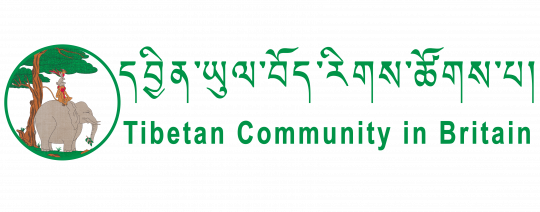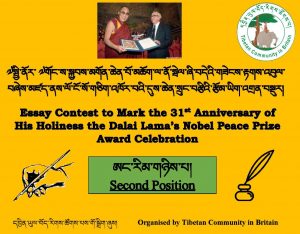What does His Holiness the Dalai Lama mean to you?
By: Nyima Woeser
The very notion of the Dalai Lama brings me great comfort and hope as we believe the Dalai Lama is the reincarnation and manifestation of Avalokiteshvara, or Chenrezi, the Buddha of Compassion and this in itself gives me a sense of assurance. In my life the Dalai Lama is a cemented guiding figure. Listening to his talks and speeches makes me understand the importance of being kind and the understanding that everything from my loved ones to this world is interdependent and impermanent. Through the teachings of the Dalai Lama, I have come to the realisation that us, as humans, have become so encapsulated and submersed in our own lives in our pursuit of material possession over human love and affection. We worry so much about what will happen in the future that we actually fail to live in the moment and when we do lose something or someone we feel regret. We take things and people for granted in a subconscious manner. Upon reading his books and messages, I feel a sense of responsibility to feel gratitude and to live a life where I am able to embrace every present moment. I feel fortunate and lucky to have a privileged life and I am committed to engage in altruistic actions whenever possible and contribute to the well-being of the community.
Furthermore, my sense of identity as a Tibetan and the reason people around the world know Tibet, in my opinion, is because of the Dalai Lama. The global recognition he receives brings attention to the Tibetan cause, where decades of occupation have had terrible consequences. Due to his fame many people around the world know about Tibetans and the Tibet issue. The Dalai Lama’s recognition stems from his infectious, charismatic personality and profound knowledge of Tibetan Buddhist philosophy. As the ambassador of wisdom of compassion and non-violence, His Holiness the Dalai Lama has attracted and inspired many people from media stars to world leaders. As a Tibetan born and raised in a foreign country, the Dalai Lama gives me a sense of pride and helps me define the roots of my identity. I feel honoured to be able to identify as a Tibetan.
The Dalai Lama is a role model and someone I look up to. All the values that His Holiness embodies and advocates, such as compassion, tolerance, forgiveness, contentment and self-discipline are morals that I believe are very important in order to live a “good” life. His humility keeps me grounded as a person, especially when the Dalai Lama describes himself as a “simple Buddhist monk” despite being one of the world’s most important and revered spiritual figures. The intrinsic and inherent nature of goodness and compassion that encompasses the Dalai Lama inspires me to become a better person. It reminds me that everybody is important and that I should help people in need and engage in the smallest actions of kindness that can brighten someone’s day. As the Dalai Lama says, “Be kind whenever possible. It is always possible.” It is so simple, yet so powerful and has a profound impact on my take on life and the joy of giving.
The Dalai Lama undeniably is the beacon of hope in resolving the plight of Tibetans inside Tibet under Chinese repression. He is the indomitable symbol of unity and strength for the Tibetan diaspora in exile in their prolonged fight for justice and freedom. With the growing instances of hate, religious extremism, racial discrimination, subjugation of affirmative voices and economic disparity around the world, the Dalai Lamas universal message and advocacy of oneness of humankind, religious harmony, love, compassion, kindness and human affection is ever more relevant. Yes, the Dalai Lama is the epitome of peace and the greatest ambassador of compassion and non-violence to humanity in our collective effort towards making the 21st century a century of peace.
Importance of celebrating Nobel Peace Prize Day
The celebration of the 10th of December highlights the awarding of the Nobel Peace Prize to the 14th Dalai Lama of Tibet and it is of great importance for Tibetans. The Nobel Peace Prize is one of the 5 Nobel Prizes instituted by the will of the Swedish industrialist Alfred Nobel and is awarded to those who “shall have done the most or the best work for fraternity between nations, for the abolition or reduction of standing armies and for the holding and promotion of peace congresses”. The Nobel Prize – with its own share of controversy – is considered the most prestigious award in the world. The Nobel Prize for Peace in 1989 was presented to His Holiness the 14th Dalai Lama of Tibet in recognition of his non-violent and peaceful resolution of the Tibet issue through dialogue and mutual consensus. The Nobel Peace Prize Day celebration is an auspicious occasion for the Tibetan community and is celebrated every year by the Tibetan diaspora. The celebration of Nobel Peace Prize Day not only unites Tibetans around the world in jubilation, but also signifies victory of the act of truth as the solution for China, Tibet and the world.
In 1989 the Norwegian Committee, when awarding the Dalai Lama, put emphasis on the fact that the Dalai Lama has been an advocate and promoter of peace and non-violent resolutions when faced with violence and brutality. The Dalai Lama’s proposal for the resolution of highly pressing social issues of international conflict with regard to Tibet and of Human Rights within Tibet stemmed from his philosophy of non-violence and his ideas of reconciliation. The Strasbourg proposal and the five-Point Peace Plan to resolve the issue of Tibet through dialogue and mutual respect with Peoples Republic of China won him many accolades. It eventually led to the Dalai Lama winning the 1989 prestigious Nobel Peace Prize award and the subsequent genesis of the Middle Way Policy for the resolution of the issue of Tibet.
The conferral of the Nobel Peace Prize to His Holiness the Dalai Lama also acknowledges the struggle and oppression that Tibet has faced for more than 70 years since its annexation by the Peoples Republic of China in 1950. Ever since the unsolicited occupation of Tibet, Tibetans living in Tibet have been stripped off their human rights and Tibet lives under the continued brutal rule of China. More than one million Tibetans have died as a result of China’s ruthless occupation and these numbers continue to increase. The Chinese government enforces its control on Tibet through the threat and use of arbitrary detentions and punishments. The simple act of being in possession of an image of the Dalai Lama can result in severe consequences, including death and forced disappearances. Despite these horrendous acts of violence and brutality against Tibetans, the Dalai Lama and the people of Tibet take a peaceful stance against those who display an intrinsic nature of evil and hatred. Hundreds of Tibetans have self-immolated, set themselves on fire, to protest the repressive Chinese occupation in anticipation that there will be more awareness about Tibet’s degrading situation. Through the Dalai Lama being awarded the Nobel Peace Prize, hope has been rekindled for the Tibetans, as it acknowledges the turmoil and suffering Tibet is facing. Despite the violent, horrific actions being inflicted against Tibet, the Dalai Lama stands firmly and with resolution to fight this war through peace and negotiations.
The honor of bestowing the Nobel Prize on the Dalai Lama vindicates humanity’s renewed commitment to address injustice and honor people who tirelessly work for the benefit of others. It manifests the victory of truth over propaganda and love over hate. The celebration of Nobel Peace Prize Day every year since 1989 on 10th December is an emotional occasion for Tibetans inside Tibet and Tibetan diaspora in exile. It is not only a joyous occasion, but more importantly an auspicious day to remember the martyrs who have sacrificed their lives for the cause of Tibet and to extend our cemented commitment to the vision of His Holiness the Dalai Lama in resolving the Tibet issue through dialogue and non- violence. Ultimately, the success story of Tibet will be the success story of humanity.

